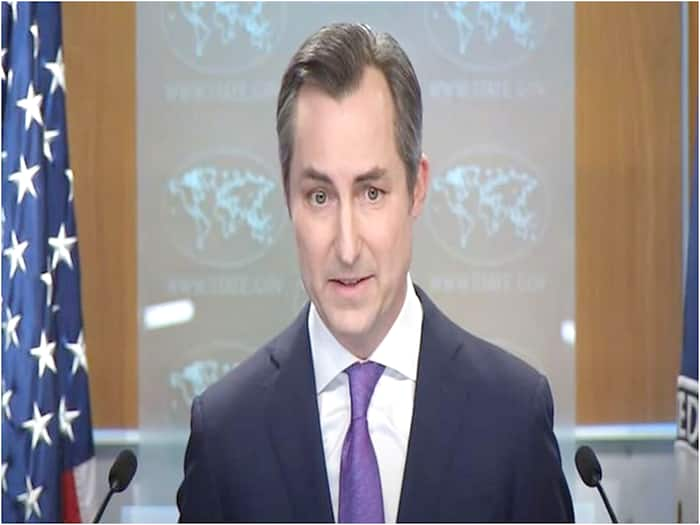The US has responded to escalating tensions between Iran and Pakistan, urging restraint from all sides.
Washington, DC: The United States on Thursday (local time) expressed concern over escalating tensions between Iran and Pakistan following Iranian missile attacks on Balochistan on Wednesday. Matthew Miller of the US State Department clarified Washington's position, saying his country has urged restraint on all sides. He emphasized that there is no need to escalate the matter. While addressing a press conference, Miller claimed that the US has taken note of the Pakistani government's recent comments on the importance of “cooperative relations between Pakistan and its neighbors.”
In response to a question about how the US government views the situation between the two countries, Miller stated that Washington is concerned about escalating tensions in the region. “We are concerned about the escalating tensions in the region. It's something that we've talked about a number of times, that we've focused on. We have been incredibly concerned about the potential for escalation since October 7,” Miller said.
“That is why we have made intensive diplomatic efforts to prevent escalation. We have noted the comments of the Government of Pakistan on the importance of cooperative relations between Pakistan and its neighbors. “We thought these were productive, useful statements, and there is certainly no need for escalation and we would urge restraint from all parties in this case,” he added.
When asked about media reports claiming that the Pakistani government had consulted Washington before the retaliatory strike on Iran, Miller said: “I don't have any private conversations to read.”
“We do not believe this should escalate in any way. Pakistan is an important non-NATO ally of the United States and will remain so, but we urge restraint in this case.”
For years, Matthew Miller called Iran a major backer of Hezbollah and one of Hamas's main supporters.
In another question about the ongoing tensions between Iran and Pakistan following strikes and counterstrikes, Miller said: “I think I made it pretty clear yesterday what we think about Iran's attacks, not just the attacks that took place over the last three days against three of its countries have been launched. neighboring countries, but the long history of financing terrorism, financing instability and sowing discord in the Middle East. That is something that we have seen contribute to the conflict in Gaza.”
The Iranian attacks in Pakistan
The Iranian attacks in Pakistan came after Iran's Islamic Revolutionary Guard Corps (IRGC) launched missiles in Iraq's Kurdistan region at what it called an Israeli “spy headquarters” and suspected ISIS-affiliated targets in Syria, Al Arabiya News reported.
“You have seen Iran as the main supporter of Hamas for years. They are the main financier of Hezbollah. They are one of the main backers of the Houthis. We have seen the consequences of the actions Iran has taken to increase regional instability and that is why we continue to take action to hold Iran accountable and also send clear messages to Iran that we do not believe this should happen in any way escalate. shape or form. Pakistan is and will remain an important non-NATO ally of the United States, but we urge restraint in this case. “We don't want to see an escalation and we don't think escalation is necessary,” he added.
The US is monitoring the situation
Meanwhile, John Kirby, National Security Council Coordinator for Strategic Communications at the White House, said the US is watching the situation involving Iran and Pakistan “very, very closely” and does not want to see an escalation.
Speaking at a news conference at Gaggle en route to Morrisville, John Kirby said, “You've all seen the reports from Pakistan that they've fired missiles at Iran. We're watching this very, very closely. We clearly don't want to see an escalation in South Asia – South and Central Asia. And we are in contact with our Pakistani counterparts, as you would expect.”
'We let the Pakistanis speak about their military operations. “I'm not going to dissect that or do that or try to operationalize it here from Air Force One,” he added.
Pakistan's missile attack on Iran
Pakistan said Thursday it has launched missile strikes on Iran and that “a number of terrorists have been killed during the intelligence-based operation,” codenamed “Marg Bar Sarmachar.”
In a statement, Pakistan's Ministry of Foreign Affairs (MoFA) said it had launched a series of “highly coordinated and specifically targeted precision military strikes against terrorist hideouts” in Iran's Siestan-o-Baluchistan province.
“A number of terrorists were killed during the intelligence-based operation codenamed 'Marg Bar Sarmachar,' the report said. Pakistan's military action comes after the country condemned Tuesday's attack by Iran, which it said killed two children.


